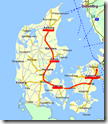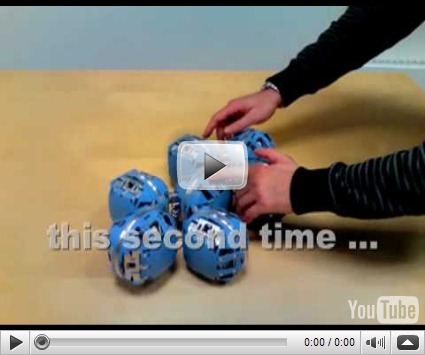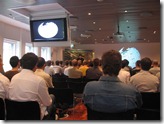I’ve been back from Denmark for a week – it took me that long to get back on Pacific time zone and dig out from the mountain of email that collected while I was gone. But I got word from my esteemed host Martin Esmann that the video of my TechTalk had been posted to Channel 9, so it seems as good a time as any for my trip report.
At each of these universities, I did two talks. The first was Pumping Iron: The State of Dynamic Languages on the .NET Framework. That’s the one in the Channel 9 video. The other talk was Developing with the DLR, which I’ve posted to my Skydrive. That talk was more focused on the CLR and DLR as a platform for language development. If there’s interest (leave a comment), I’ll record audio for that presentation and post it up on SlideShare or something like that.
Aalborg University
First stop of the University Tour was Aalborg University – about a four hour drive from Copenhagen (or as the Danish spell it København). As you can see on the map, we started with the furthest university away then worked our way back to Copenhagen. Martin picked me up at the airport and we hit the road. I was horribly jet lagged, but we spent most of the drive geeking out about programming languages (when I wasn’t napping).
Each of the universities had a different focus that I was interested in. At Aalborg, it was in teaching programming. Given the popularity of Python in education, we had lots to talk about. My host at Aalborg was Bent Thomsen who has done significant research on this topic, as has his wife Lone. One of the areas we discussing in particular was about teaching classes vs. objects first. Apparently, these days there’s significant momentum behind teaching class first, but the folks at Aalborg – as I understand it – have seen that approach has been ineffective. That squared with a talk I saw on teaching OOP with Python that I saw last year at PyCon by Dr. Goldwasser.
The other area we discussed was teaching compiler design. Clearly, this is an area I thought the DLR could be a big help in. Bent primarily uses Programming Language Processors in Java to teach this course, but he finds that it’s a little out of date + he’s much more interested in the compiler aspect than the interpreter aspect of that book. The idea of generating DLR Expression Trees which can be compiled into IL with a simple call to LambdaExpression.Compile and can then run directly on the CLR seemed to sound appealing to him.
Aarhus University
Next up was Aarhus University. I didn’t get to spend as much time with the folks from Aarhus, though our host Olivier Danvy did help me find a “uniquely Danish” gift for my wife (though I also brought her Danish bread & chocolate). We spent some time talking about F# and compiler design, and Olivier made this great comment over lunch that “OCaml is a domain specific language for compiler writers”. That is very true.
Olivier had to leave for a previous engagement, so Jan Midtgaard – who teaches Aarhus’ Compilation class – hosted me for the actual talks. In that class, they implement a subset of Java known as Joos in AspectJ. One of the cool things about this class is how they grade the compilers – you upload your complier code to a web site and they run it against an existing test framework. They couldn’t give the students the test framework directly because it would be too easy to reverse engineer the tests from the compiled Java code (I assume the Java world has the equivalent of Reflector?) Like Aalborg, I spent significant time discussing the idea of targeting the DLR in their compiler class.
University of Southern Denmark
Of the four universities I visited, this was probably the poorest fit for the content I was delivering. On the other hand, it was awesome – USD has a strong focus on Robotics. They even have a RoboDays Robot Festival in Odense. Unfortunately, the festival was the weekend after I visited, so many of the robots were out in preparation for the festival. However, our host Ulrik Schultz did bring us to to visit the Modular Robotics Research Lab so I got to see these guys in action:
Real transforming robots! Not quite Optimus Prime mind you, but you gotta start somewhere. These robots are call ATRON and they’re pretty impressive to see in action. However, they are kinda weak computationally – they only have 128k of flash memory + 4k of ROM. 4K! However, the next generation of these bots is supposed to have like 64MB of memory and a FPGA – more than enough power to use the the Micro Framework.
University of Copenhagen
The final stop on my university tour was University of Copenhagen, where I was hosted by Fritz Henglein of the Algorithms and Programming Languages Group. He’s done some research on dynamic languages, but these days he and his team are doing some fascinating research on the intersection of business and programming languages. He leads a project called 3gERP in partnership with Microsoft Development Center Copenhagen to “develop a standardized, yet highly configurable and flexible, global ERP system for SME’s based on fundamentally new software architecture.” That topic isn’t as interesting to me in my current role in the VS Languages team, but was very relevant to my background in services architecture and MSIT.
Copenhagen .NET Users Group
While I was in Denmark, I got to speak to the local .NET users group about IronPython. These are always fun since they are less formal. Also, this was a much more .NET knowledgeable crowd than I had had all week so I got some deeper questions about the .NET stack. Among the members of that user group is Mads Kristensen, founder of the BlogEngine.NET project. So I put together a special demo “integrating” IronPython into BlogEngine.NET. It was kinda silly – I wrote an extension that would execute any blog post as python that was in the RunPython category. But it was also mind-numbingly simple:
[Extension("Extend .NET Blog Engine with IronPython")] public class IPyExtension { static ScriptEngine _engine; static IPyExtension() { _engine = IronPython.Hosting.Python.CreateEngine(); Post.Serving += new EventHandler<ServingEventArgs>(Post_Serving); } static void Post_Serving(object sender, ServingEventArgs e) { Post p = (Post)sender; bool runpython = p.Categories.Exists(delegate(Category cat) { return string.Compare(cat.Title, "RunPython", true) == 0; }); if (runpython) { e.Body = _engine.Execute<string>(e.Body); } } }
I’d love to see REAL IronPython integration into BlogEngine.NET, but I needed something I could do in a couple of hours late at night in a code base I wasn’t familiar with.
Pumping Iron TechTalk
Finally, on Friday I delivered my final talk of the week, which is available to watch and download from Channel 9. It was a packed house and I was a little nervous about having the talk recorded, but I think it went well. Certainly, it seemed well received by the audience.
I ended the work part of my trip to Denmark with an interview with a Danish IT newspaper (which I’ll post a link to when it gets published) and a sit down with the Dyanmics:NAV team. My wife always tells me that she’d love it if I got a 6-12 month assignment to work overseas, so I tried to convince the NAV team that they REALLY want to integrate IronPython like the Dynamics AX team is doing. If you see a post here about me moving to Copenhagen, you’ll know I was successful! 😄
Final Thoughts
Other than the jet lag, which seemed tougher on this trip than when I’ve gone westward to New Zealand, Australia or Malaysia, I had a blast. It was a real treat seeing so much of Denmark and getting to talk to so many interesting people. I even got to do some sight seeing in Copenhagen and Odense. Hans Christian Andersen was born in Odense and so I got to see the house he was born in as well as get my picture taken with this statue of him right outside our hotel. Major thanks to Martin Esmann for inviting me, driving me around – we drove a megameter, aka 1000km, over the course of the trip – and being an all around amazing host.




Comments: